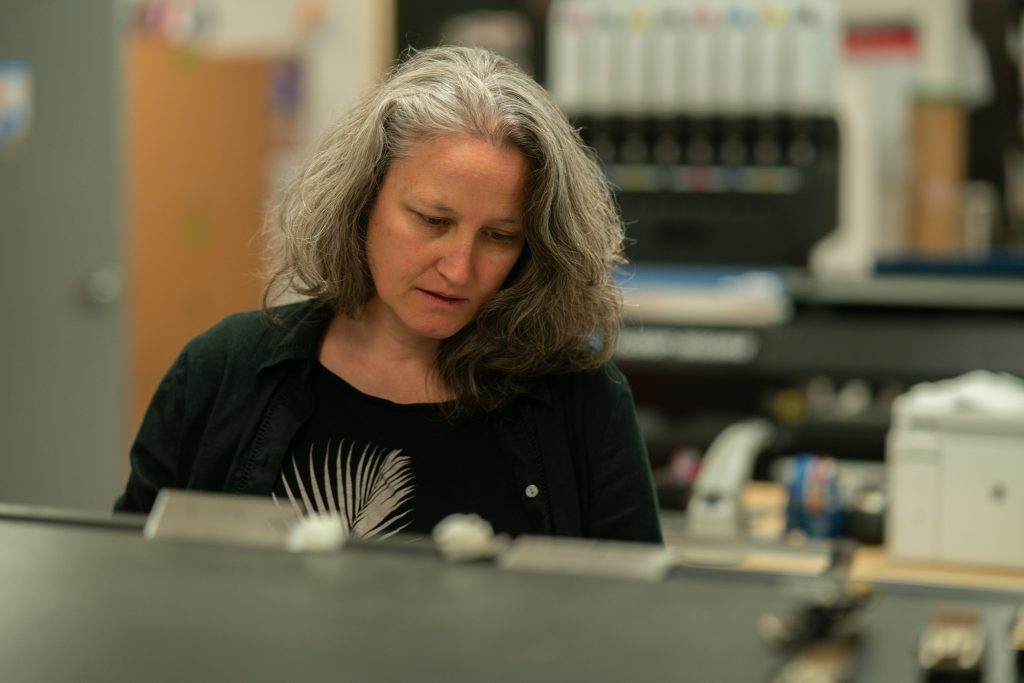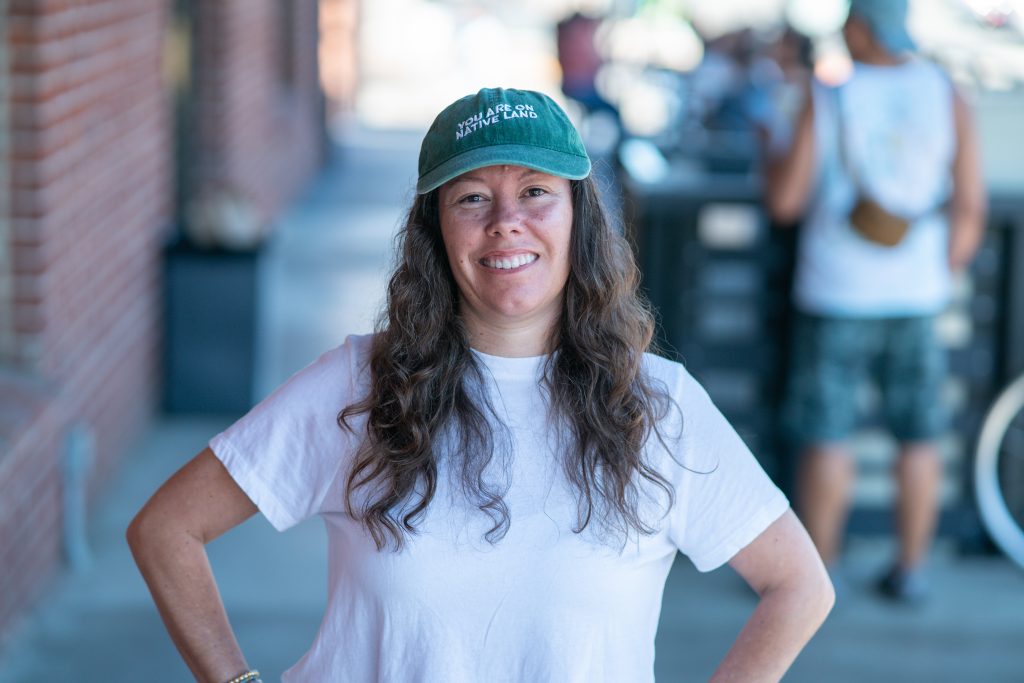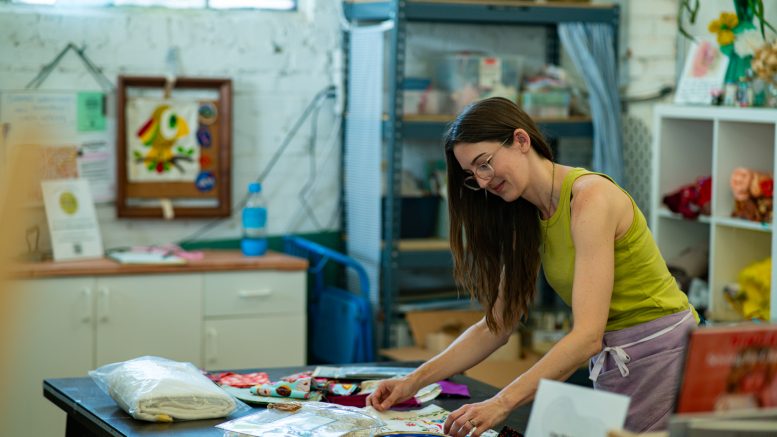By Justine Chahal
A group of artists gather around a table lined with supplies: Speedball Speedy Carve Blocks, tools for carving linoleum and ink. An instructor guides the group as they carve a design into these blocks, finalizing an image they will press onto the old shirts they have brought with them. When the artists finally use their new fabric stamps, they transform an old item into a new work of art. This is one of the goals that Maris Kaplan, creator of Broad Cloth Community Fiber Studio, had when she first proposed its creation.
“I’m really hoping to spread awareness about creative reuse and specifically skills related to fiber arts and sewing like mending,” Kaplan says. “Just normalizing and encouraging less waste.”
Broad Cloth Community Fiber Studio, which launched this April, is a fabric art-focused space offering beginner-friendly monthly sewing workshops. The workshops happen inside Broad Room Creative Collective, a nonprofit organization that provides art supplies donated to its Free Art Supply Closet Network to artists.
Kaplan, who has volunteered at Broad Room since 2020, says she uses the donated sewing supplies for the workshops. “I think doing these workshops and introducing people to the different forms of textile art and how they can overlap and how they can both be practical and fine-art oriented, I think is really important to seeing the wide range of what you can do with it,” Kaplan says.
Although there are spaces in Sacramento dedicated to textile art, like Topstitch Production, Kaplan says she was disappointed there was not something similar to the East Bay Creative Reuse Depot; a nonprofit organization dedicated to redistributing goods as supplies for art and education in Oakland where she previously lived.
Although Kaplan runs the Broad Cloth Community Fiber Studio by herself, she says she invites other artists to lead classes and co-facilitates alongside them so every attendant can receive assistance. Kaplan has received many inquiries from people interested in leading workshops and volunteering.These fellow artists are also concerned about fabric waste, like Heather Hogan who taught a fabric-stamping workshop at Broad Cloth.
Hogan says she became interested in sewing as a form of environmental activism, especially since textile waste felt like a climate challenge she was directly involved in. Now, she “upcycles” items with the intention of keeping reusable materials out of landfills.
“There’s always kind of been a fashion scene in Sacramento but I think it’s expanded a little more now that maybe post-COVID people are interested in sewing and mending and the right to repair movement,” Hogan says. “I think it’s just bubbling up for people who are noticing fast fashion issues and wanting to repair and make their clothing more unique.”

Landfills in 2018 received 11.3 million tons of municipal solid waste in the form of textiles, the majority of which were clothes, according to the U.S. Environmental Protection Agency. The recycling rate for all textiles was only 15%, resulting in 2.5 million tons being recycled.
California politicians also appear concerned about textile waste, as evidenced by the creation of Senate Bill 707, The Responsible Textile Recovery Act of 2024, requiring apparel producers to join a producer responsibility organization.Through these organizations, producers become responsible for submitting to CalRecycle their plans for the management and recycling of textile items.
Kaplan says she hopes workshops attendants are able to share these sewing skills, which used to be traditional, with future generations in order to keep them alive. Corley Pillsbury is an artist who co-facilitated a mending workshop where people brought in old fiber items they wanted to repair. She says she loves the idea of mending becoming the norm again.
“It was really gratifying to see people sort of understand what they needed to do to successfully get something that had been torn or broken for a while, or that they had maybe been putting off because they felt overwhelmed by the idea of actually mending it,” Pillsbury says.
While learning to sew for the first time can be intimidating, Pillsbury says the only way a person can learn is by doing. She added that Broad Cloth’s free materials can be valuable for both beginners and experienced textile artists.
Linsey Martin, an artist who runs small textile business Mālama Macramé, attended a workshop hosted by Broad Cloth, and says she has already signed up for the next one.
“I like that they’re community-based,” Martin says. “I think that they always support their artists and other makers so that’s really important to me so I want to reciprocate that in any way I can.”

Although Broad Cloth is a recent addition to Sacramento’s art scene, Kaplan wants to offer classes in additional locations and provide youth education. Kaplan also hopes to turn Broad Cloth into a nonprofit organization so it can receive funding. For now, she will see where the future of the workshop studio goes.
“It was really cool to see the community really embrace it and get really excited about it,” Kaplan says. “It shows that there really is a kind of a need for that and people who are already familiar with Broad Room and familiar with the Free Art Supply Closet —it’s just one more way for them to get involved and support.”
This story was funded by the City of Sacramento’s Arts and Creative Economy Journalism Grant to Solving Sacramento. Following our journalism code of ethics and protocols, the city had no editorial influence over this story and no city official reviewed this story before it was published. Our partners include California Groundbreakers, Capital Public Radio, Outword, Russian America Media, Sacramento Business Journal, Sacramento News & Review, Sacramento Observer and Univision 19.


Art and recycling—- such a great concept!!!
It’s inspiring how these artists are helping each other as well as the environment.
Kaplan’s approach to running the Broad Cloth Community Fiber Studio is both inclusive and collaborative, fostering a sense of community and shared purpose among artists. By inviting others to lead workshops and co-facilitating alongside them, she ensures that each participant receives the support they need while also encouraging creative exchange.